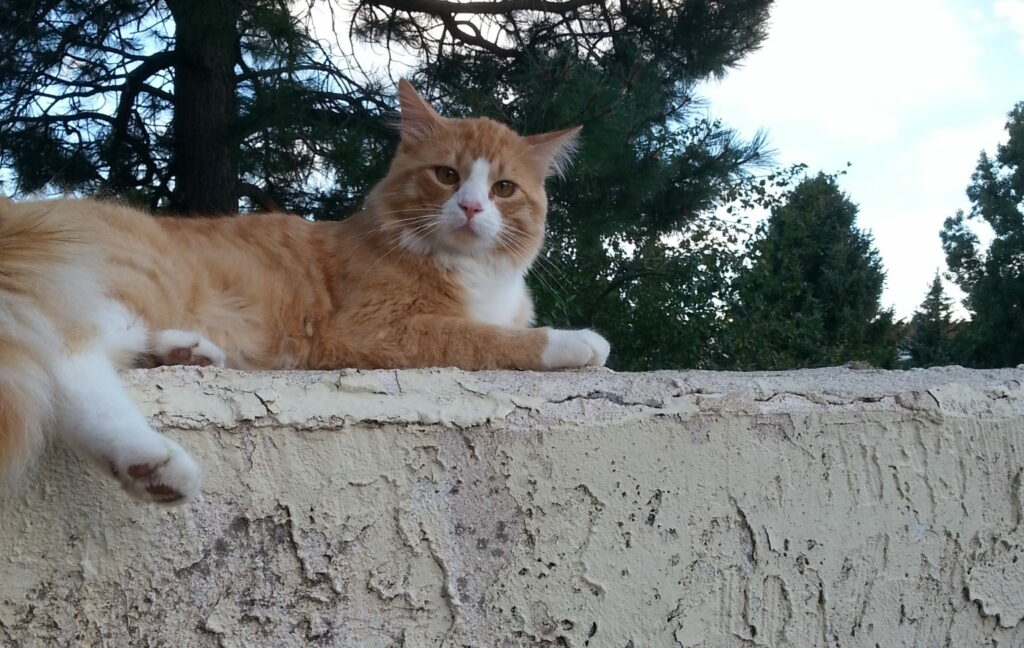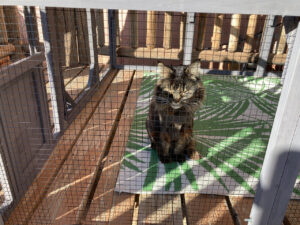 There has been a stray cat hanging around the house. He is friendly and after a few weeks of feeding him and scratching his head, you decide to adopt him. You do the responsible thing and take him to your vet for an exam, vaccines, and FeLV/FIV test.
There has been a stray cat hanging around the house. He is friendly and after a few weeks of feeding him and scratching his head, you decide to adopt him. You do the responsible thing and take him to your vet for an exam, vaccines, and FeLV/FIV test.
To your chagrin, he tests positive for one of the viruses. What’s next?
caring for cats with felv or fiv
medical care
Like any other cat, medical care for cats infected with FeLV or FIV virus consists of preventive healthcare and managing clinical illnesses when necessary.
Preventive Health Care
Preventive healthcare centers around veterinary exams, routine parasite prevention, vaccination, and dental care when needed. However, bi-annual exams are recommended for the virus-infected cat and special attention is paid to (Reference 1):
- the mouth: cats with FeLV or FIV are more prone to dental disease
- the eyes: is there inflammation of the anterior (between the cornea and iris) or posterior (between the iris and the lens) chambers of the eyes?
- the size and shape of the lymph nodes
- the skin: are there external parasites, fungal infections, indications of cancer?
Other recommendations are similar to those for a healthy cat but compliance is more crucial due to the virus-infected cat’s immunosuppression (Reference 1):
- routine deworming
- feed complete and balanced diet, avoid raw food (risk of food-borne disease and parasites)
- annual screening bloodwork including a Complete Blood Count (CBC): a CBC is recommended every 6 months for FeLV infected cats; every year for FIV positive cats
- vaccines must be kept up to date to keep these cats from contracting upper respiratory infections and panleukopenia
Managing Clinical Illness
Like healthy cats, cats with FeLV and FIV can suffer from kidney disease, hyperthyroidism, diabetes, and urinary tract infections. Treatment for these diseases will follow the same protocols as for healthy cats (Reference 1).
Diseases secondary to immunosuppression account for a large portion of the syndromes seen in FeLV-infected cats. Be on the lookout for persistent diarrhea, sneezing, nasal discharge, inflammation of the eyes and recurring skin infections.
In cats with FIV, stomatitis (inflammation of the mucosal membranes of the mouth) is common (Reference 2). Untreated, this is a painful condition that may keep the cat from eating. Removal of most or all of the cat’s teeth may be needed reduce the inflammation and pain.
Cats with FeLV and FIV are prone to developing tumors, primarily lymphomas. FeLV infected cats are 62 x more likely to develop these tumors than healthy cats; FIV cats are 5 x more likely (Reference 2). Be sure to bring any lumps you feel on your cat to your veterinarian’s attention.
managing cats with Felv or fiv in the homE
- Cats with FeLV and FIV should be kept indoors if possible. However, if your cat likes to go outdoors, consider leash walks, cat enclosures or yards with cat fencing.
- Make sure to provide a home environment that reduces stress and provides enrichment (see What Your Cat Needs to Feel Secure )
- Spaying and neutering infected cats reduces the likelihood of fighting and transmission of the virus.

A catio allows a cat access to the outdoors while keeping her safe.
Reducing Transmission of the Virus
CATS WITH FELV
It is BEST to keep the infected cat indoors and separate from other cats in the household. If this is just not going to work, here are some tips to reduce transmission of the virus. (If your infected cat has clinical signs of illness (may be shedding the virus), he must be isolated).
- Remember FeLV is spread by saliva. It can be hard to keep cats from grooming each other but you can make sure cats don’t share food bowls by meal-feeding cats separately or using micro-chip feeders.
- The FeLV virus is not very hardy and does not live long outside its host. Common disinfectants quickly inactivate both FeLV and FIV viruses.
- Scoop litter boxes promptly and clean litter boxes regularly.
- VACCINATE uninfected cats even if they are isolated from the infected cat. This provides uninfected cats protection from progressive infection.
- Consider separating the infected cat from the others when you cannot supervise him.
Protective immunity takes 2-3 weeks after the primary vaccination – this would be the second dose in the initial series of two shots. Remember, there is no therapeutic value to vaccinating the infected cat for FeLV (Reference 1).
CATS WITH FIV
Mixed households with FIV infected cats have a fairly small risk of uninfected cats acquiring the virus if there is no fighting (cat bites) among cats. It is not recommended to introduce new cats into such a mixed household – fighting may occur during the introductory period, transmitting the virus to an uninfected cat.
Treatments for cats with FELV or fiv
Antiviral drugs used in the treatment of HIV have been shown to increase survival times and improve quality of life for human patients. However, studies have not shown that using such antiviral drugs in cats to be effective.
Zidovudine (AZT) is one of the few antiviral compounds that has been found to be effective in cats with FeLV or FIV: it can reduce viral load and improve symptoms in cats with neurologic signs or stomatitis (Reference 1).
Diagnosis of FeLV or FIV in a cat is not an automatic death sentence. The viruses can be managed through attention to the cat’s overall health, regular checkups, and prompt attention to clinical signs of illness. FeLV cats often suffer clinical illness and have a shorter life expectancy than cats infected with FIV. Cats with FIV often live as long as uninfected cats, dying of causes unrelated to their virus infection.
references
- Little S, Levy J, Hartmann K, et al. 2020 AAFP Feline Retrovirus Testing and Management Guidelines. Journal of Feline Medicine and Surgery. 2020;22(1):5-30. doi:10.1177/1098612X19895940
- Hartmann K. Clinical aspects of feline retroviruses: a review. Viruses. 2012 Oct 31;4(11):2684-710. doi: 10.3390/v4112684. PMID: 23202500; PMCID: PMC3509668.


